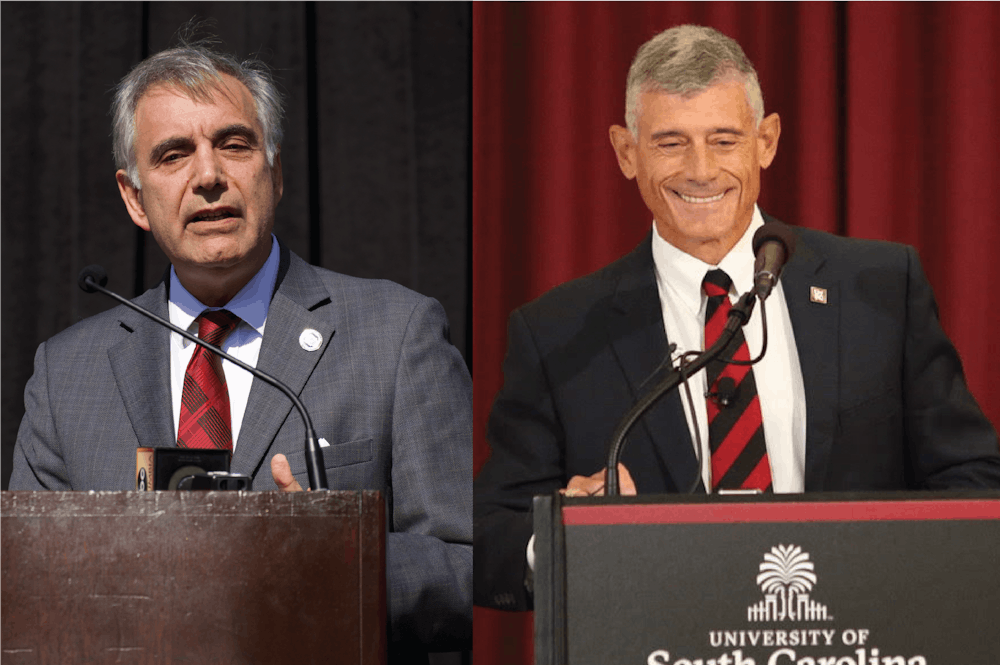The class of 2021 studied under two seemingly different university presidents, but there was one consistent trait between the Pastides and Caslen administrations: a total lack of accountability to the student body.
Our current president's issues started before he even took office. Despite student protests and the faculty senate voting unanimously against his appointment and his lack of qualifications, Robert Caslen was appointed university president in 2019 thanks to Gov. Henry McMaster’s support.
Since his initial appointment, Caslen's reputation has become more mixed. Some faculty and board of trustees members have changed their stance and expressed support for his presidency, especially regarding his hires elsewhere in the administration.
However, his administration still suffers from the fact that its largest constituency, the student body, has no real influence over the decisions made about its university.
This problem did not arrive on campus with Caslen — President Emeritus Harris Pastides’ tenure had similar problems.
Many examples span administrations. For example, both Caslen’s and Pastides’ administrations showed a total lack of transparency and accountability regarding how they both essentially ignored the allegations of sexual harassment and abuse against professor David Voros, with whom Pastides was a personal friend.
Caslen’s and Pastides’ administrations also both refused to seriously engage with their university’s racist past and present.
In 2015, a group of students put together a series of 12 demands entitled the "2020 Vision" campaign. It demanded that the university acknowledge its history of enslavement, expand its minority recruitment efforts, improve its efforts around student mental health and address other social justice issues.
After a walkout and demonstration on the Horseshoe, the administration began dialogue with the campaign’s leaders. Some changes were made, most prominently the plaques on the Horseshoe about USC’s history of slavery, but for the most part the administration had a “clear refusal to acknowledge 2020 Vision,” according to former Honors student Clarie Randall in her senior thesis.
In the administration’s words, the changes were made “because it’s the right thing to do,” despite the fact the changes might not have happened without the campaign.
Caslen is currently using a similar strategy. Instead of recognizing and immediately acting on the demand from students to rename the buildings on campus that are named after racists, Caslen created a “Presidential Commission on University History” in 2019. After more than a year, the committee released a list of buildings for possible renaming and a list of possible options for new namesakes. The administration has not acted on them.
Students have: Student activists took matters into their own hands and renamed the campus library after "Dean" Willie L. Harriford, USC’s first Black administrator.
If Caslen had any real interest in listening to students (or any of the other people who demand renamed buildings), there are clearly more efficient ways to do so.
These examples are just a handful of the ways in which the administration has ignored student concern over multiple university presidencies. In reality, this is a much deeper issue than just who happens to be university president.
The central problem is systemic — it’s a matter of how the university is organized. Formal student power on campus is limited to Student Government and the Residence Hall Association, whose powers are mostly limited to appropriating some of the money students pay through various fees. These student-led organizations are buried under layers of bureaucracy and are essentially powerless without the administration’s consent.
When we look back over the last four years, we must recognize that the people who actually make campus function — the students, faculty and staff — have very little power over how the university is run. It’s hard to see our school as a real community when most of us have so little say.
Our goal looking forward should be to highlight this contradiction and work to empower the more powerless members of our community, including the student body.

